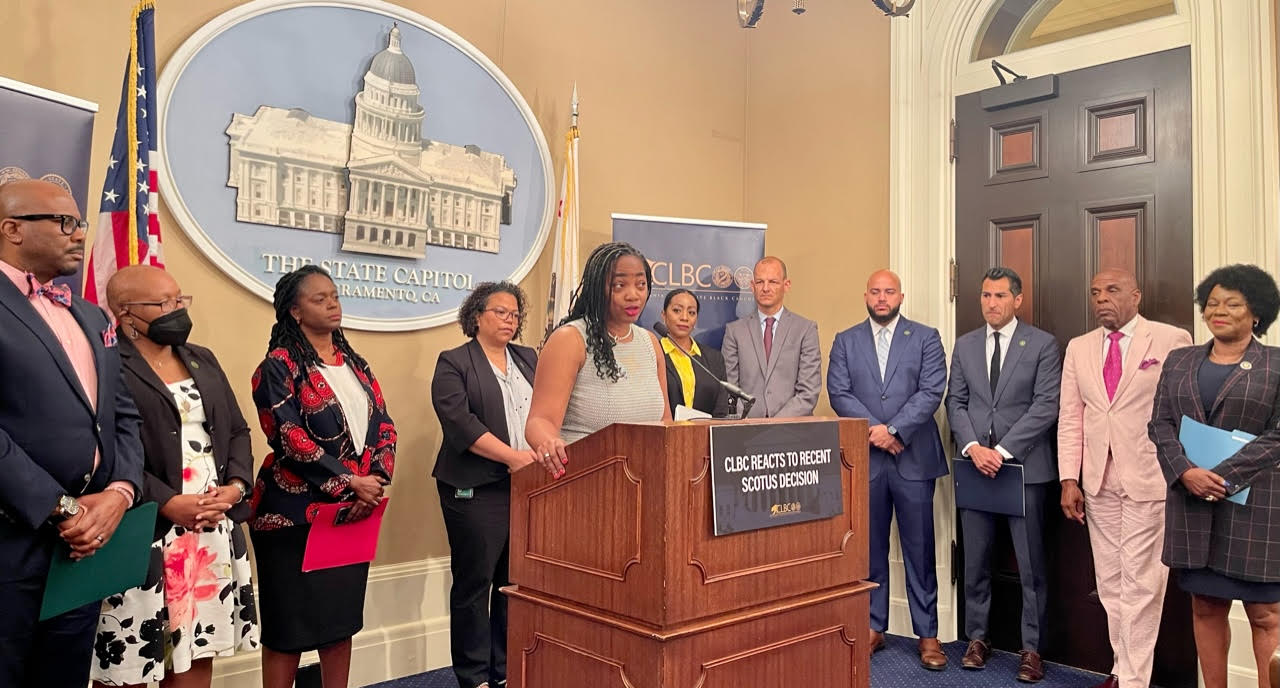Antonio Ray Harvey | California Black Media
The California Legislative Black Caucus (CLBC) held a press conference to condemn the recent Supreme Court of the United States’ (SCOTUS) decision on affirmative action.
“In the wake of today’s Supreme Court decision, the California Legislative Black Caucus is extremely disappointed in the continual unraveling of hard-won fights for civil rights, equity, and the dismantling of systematic racism,” said Assemblymember Lori D. Wilson (D-Suisun City), Chair of the CLBC.
“However, our unwavering commitment to continue the fight against the legacy of racism and discrimination that still impacts society today has not been shaken,” Wilson continued at the press conference held July 5. “We understand the work we do as legislators is vital to ensure equitable access and opportunity are available to Black Californians and remain steadfast in our dedication to advancing policies that improve the lives of all our constituents.”
On June 29, the SCOTUS ruled 6-3 to outlaw affirmative action in college admissions. The ruling resulted from cases brought against Harvard University and the University of North Carolina in which plaintiffs argued that affirmative action policies at those schools discriminated against Asian American and White Students.
The SCOTUS’ opinion which breaks with 45 years of legal precedent, states that considering students’ race to diversify student bodies violates Title VI of the Civil Rights Act of 1964 and the Equal Protection Clause in the Fourteenth Amendment.
Last week, U.S. Rep. Barbara Lee (D-CA-13) wrote an opinion piece on the SCOTUS’s decision. She reflected on being present when Prop. 209 eliminated affirmative action programs in California in the areas of public employment, public education, and public contracting from providing “preferential treatment” based on race, sex, color, ethnicity, or national origin.
The measure affected admissions and other programs at the state’s public universities and funding for public schools (kindergarten through 12th grade), community college programs, as well as government contracting.
“I argued against ending affirmative action in California before the (University of California) UC Board of Regents over 20 years ago,” Lee posted on Twitter on July 2. “I knew then what I know now: ignoring race doesn’t make racism go away. It makes it worse.”
On the same day as the SCOTUS’ decision, the California Task Force to Study and Develop Reparations Proposals for African Americans submitted its 1,075-page final report to the California legislature.
The report includes 115 recommendations and a request for a formal apology from the state for state laws, policies and practices that disproportionately and negatively affected Black Californians.
Ethnic Media Service and California Black Media invited litigators who defended Affirmative Action before the U.S. Supreme Court to reflect on the court’s ruling and its broader impact two days after 11 members of CLBC convened at the State Capitol to express their opinions on the ruling.
A discussion about next steps for racial equity, including a lawsuit against “legacy admissions” at Harvard, was also addressed. Legacy admissions give special consideration to children of alumni during enrollment decisions.
Part of the litigation team, Jin Hee Lee, Director of Strategic Initiatives at the Legal Defense Fund (LDF), was one of the participants on the panel. LDF represented clients of color and alumni organizations at
Harvard who opposed the dismantling of Affirmative Action, from the trial level to the Court of Appeals, to SCOTUS.
“It will make it extremely difficult for universities to be able to consider race as part of the admission process,” Lee said. “(The decision) is a blow to efforts to advance equal opportunities and racial equality in our educational system which suffers from tremendous dysfunction and inequality.”
Three days after SCOTUS’s ruling, the Lawyers for Civil Rights (LCR), a legal nonprofit in Boston, filed a civil rights complaint against Harvard with the Education Department. LCR is arguing Harvard’s legacy admissions process unfairly benefits White family members, many who donate money to the school. According to College Transitions, approximately 75% of the top 100 colleges in the U.S., including all Ivy League schools and most elite private universities, favor legacy status.
Sen. Steven Bradford (D-Gardena), vice chair of the CLBC, expressed his views on legacy admissions.
“This begs the question: is this court committed to putting everyone on an equal footing? Well, then legacy admissions should be addressed as well if that’s the case,” Bradford said. “A recent study found that 43% of White students admitted to Harvard were admitted based on legacy, based on family members, based on donors, based on athletes, or again, based on faculty or staff. Why should children of alumni and wealthy donors get special treatment? This is wrong.”
Justice Clarence Thomas, the second Black man appointed to the high court, wrote that the decision exposes universities’ admissions policies as “rudderless, race-based preferences” to ensure a specific racial mix in their classes.
Those who disagree with the court’s ruling believe the fight for racial justice in higher education, particularly for African Americans, is not over.
A coalition of California business groups and corporation owners said in statement that the “statewide business community remains steadfast” in its “commitment to creating job opportunities and improving the diversity of our businesses across all sectors.”
“As part of our ongoing commitment, we will work to educate employers about the Supreme Court’s decision and how we can ensure that our employees and their families continue to know they are an integral part of our businesses and our communities.”







